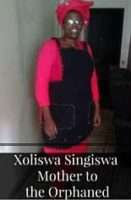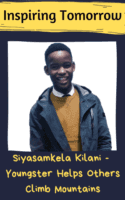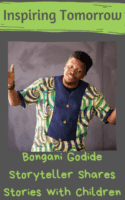It’s often said that it ‘takes the whole village to raise a child’, but sometimes it takes someone’s child to uplift a whole community. Forty-four-year-old Xoliswa Singiswa, from Guguletu in Cape Town, set up and runs a nutrition centre, Ekhaya Project. It serves no fewer than 500 children and young adults in her community every weekend!
“In 2000 I moved to Pretoria and my husband and I stayed in a flat. At the bottom of the flat, there were two boys who were selling newspapers. We always had leftovers at our flat, because it was only the two of us. What we’d do is take those leftovers and give them to those boys,” she remembers.
The calling to put food in needy people’s mouths grew too loud for Xoliswa and her husband to ignore. “It got to a point whereby we said, ‘OK, rather than cooking for two, let’s cook for the four of us so that we always have food to give to them.’ For the first time I got exposed to street-kids and the harsh conditions they lived under, so that we started cooking for them as well. At the time I was working at SARS and I’d also collect the leftovers whenever we had a function there.”
In 2003 the couple hosted their very first Christmas party for the children, just to make them feel cared for. However, their involvement grew steadily.
“It became so personal that we wanted to know how they ended up in the streets. We managed to locate few of their parents. We wanted to know whether they were aware of their children’s whereabouts. We found there were different reasons. Circumstances drove some of them to the streets. We managed to take them to homes, and find them IDs.”
Xoliswa always felt that charity began at home, and so she decided to go back to Cape Town where she established Ekhaya Project, which loosely translates to ‘home’ project.
“We came back to Cape Town in 2005 and realised that many of the people we grew up with had passed on, and children were left orphaned. We said, ‘Let’s start this nutrition centre’. We also look for bursaries because the only thing that will take the orphans out of poverty is to get educated. The smiles on their faces just lightened up my days.” She adds that they’ve had six graduates from their programme to date.
Xoliswa says she also cannot bring herself to marginalise the children who’re a little more ‘privileged’ than orphans are.
“These kids aren’t the same but the area and atmosphere cannot be categorised. Some may come to dish up here wearing a branded sneaker but that doesn’t necessarily mean their parents are rich. Sometimes parents just want to make their children feel good about themselves, so they may not feel different from others. Sometimes, we want to take them out [of the programme] but I cannot say, ‘Your parents have a car so you can’t come’.”
For that reason, she says Ekhaya Project is not reliant on official, traditional funders. “We don’t get funding; we ask for sponsors because funding complicates things for us. I cannot categorise my children and say this one is better than the other cos they’re all fighting different battles. We cannot put a tag on and minimise them as funders would like us to.”
Xoliswa and her husband continued from where they had left off in Pretoria, bringing light to those left in the dark, in a variety of ways. She recounted some examples: “We resumed our Xmas parties and we host them twice a year now. We took one child to pre-school, and handed him over to social workers. One of them once came to me: ‘Sis Xoli, my mom passed away three weeks ago and we are still unable to bury her’. I’m their hope and I cannot disappoint them,” she says.
The couple also run an aftercare programme that focuses on fun events, such as hiking on Table Mountain.
One five year old, with his full lunchbox pressed against his chest, spoke about how life was for him before he was introduced to ‘Sis’ Xoli’, as they call her.
“Mna bendilamba before ndize apha ku Sis’Xoli, ngoku nd’yahlutha bhut’. (I used to starve but Sis’ Xoli’s food fills my stomach now,” his soft voice murmured, while his teeth sank into the apple his tiny hands had a firm grip on.
Twenty-five-year-old Charlie Dyasi is visually-impaired and an Ekhaya Project product. He also had nothing less than gratitude to express: “I’m on my way to the library now. I don’t know where I’d be without Sis’ Xoli. I knew I could always cry on her shoulder whenever I needed something. She was, and still is, like a mother to me. This has always been the second home to me,” he said, treading confidently with his white cane folded up in his hand. Ekhaya Project helped him enrol for a computer course at I-Can Centre.
Perhaps, what makes Sis’ Xoli’s work extraordinary is that she puts food on other peoples’ tables while she herself doesn’t have any salary to her name. “I resigned from my job in 2015 because it wasn’t fulfilling. I don’t do something that doesn’t bring peace to my heart. Serving these children is everything to me. I can’t live without them. My soul says ‘yes’ to this. There are hardships but we always had something to serve for the kids.”
So, if she’s unemployed and doesn’t get funding, where does she get the financial means to run the project?
“My husband’s the pillar of my strength. He ensures we always have something to cook for children, and even helps with the cooking. My siblings also help with serving, as we run the project from my parents’ house.”
Sis’ Xoli has seven siblings and one child of her own. “I used to cry myself to sleep that I couldn’t conceive for the second time, but now I know it was a blessing in disguise. I don’t think the passion, the zeal and the desire to be with the children would be the same if I had a lot of kids. I can afford to run the project cos I have one mouth to feed.”
While there was a lot of good to get from them, Sis’ Xoli is most grateful she inherited compassion from her grandparents and parents.
“My granny provided medication to TB patients; she ensured that they took it as often as they were required to. She never thought I’d get infected. My mom was a principal and she’d take our unused clothes and donate them at her school. If you don’t share the little that you have then there’s no possible way it could expand. Greed hinders your blessings but the work that we do opens up for more blessings.”
The same way her parents passed all that to her, Ekhaya Project has given birth to another project: Camagu Bafazi.
“It’s a training development entity looking at training adults. Here [at Ekhaya] we’re trying to change children’s mind-sets but they go back to broken homes. So we’re saying it’s better for the society to develop a healthy-minded child, than trying to mend [them later as] a broken adult. We saw the need to educate their parents about child health care and nutrition. We want to change the perception that healthy eating is for privileged people.”
Sis’ Xoli says she acknowledges the unemployment rates, but, “The youth should prioritise education. It’s better to be an unemployed graduate because you’ll then be open-minded enough to find other ways of living.”
In conclusion, Xoliswa echoes the words that previous Inspiring Tomorrow people have expressed: that your background doesn’t determine your future.
“Poverty is not going to stop you from climbing that Table Mountain. You staying in Gugulethu is not a dead-end. Kids must look beyond their toes. There were gangsters when we grew up but we chose this life. I’ve a dream to operate the project 24/7 in the near future, because there’s a need for it. Your children don’t have to be as poor as you were – you must break the chain now.”







